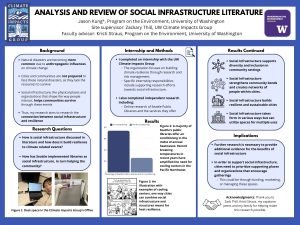Evaluating Social Infrastructure’s Impacts on Community Networks to Build Resilience
Urban landscapes are constantly changing and, with the pressure of climate change, cities are not able to respond to disasters fast enough. One proposed solution is social infrastructure, which can be defined as a space where people in a community can gather and connect with one another. The purpose of this study was to find out how social infrastructure brings communities closer together, eventually leading to networks of people that are able to rely on one another in various situations. During my time with the Climate Impacts Group, I researched and analyzed articles relating to the benefits and implications of social infrastructure. I created a database in Zotero with over 40 of these articles for future reference and compiled my findings from the articles in a written report. Independent study was also conducted in Seattle to find examples of local social infrastructure in libraries and the conscious efforts by the city to build resilience to the recent heat waves. From these methods, it was clear that social infrastructure is necessary for cities as it supports diversity and inclusion, strengthens community and builds resilient and sustainable cities. Communities that are able to rely on each other more are able to mobilize resources faster, thus building resilience in case of climate-related disasters. Furthermore, in the long term social infrastructure builds civil societies, supports the health and well-being of local residents, and builds climate resilience through community.
